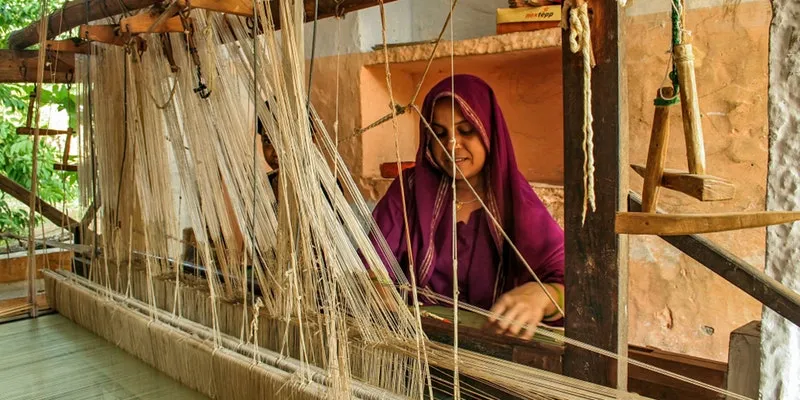5 MSME schemes for reviving traditional industries and rural entrepreneurship
These government schemes provide collateral-free credit, access to incubation centres, better equipment, employment opportunities, and more for MSME entrepreneurs from various corners of India.

India has a rich history of rural entrepreneurship in traditional industries such as coir, khadi, bamboo, cane, and more. Government bodies such as the MSME Ministry have been running various schemes to support and grow these industries.
These schemes range from providing collateral-free credit and access to incubation centres to better equipment and employment opportunities for entrepreneurs in various corners of India.
Most recently, Finance Minister Nirmala Sitharaman's maiden Budget presented in Parliament on July 5, 2019 focussed on reviving traditional industries such as bamboo, khadi and honey, through a cluster-based approach.
"A hundred new clusters for traditional industries will be created in 2019-20, and this will allow 50,000 artisans to join the economic value chain," she said.
This will be done under the Scheme of Fund for Regeneration of Traditional Industries (SFURTI), which aims to organise such industries and artisans into clusters to make them competitive and provide support for their long-term sustainability, sustained employment, and enhanced marketability of products.
Besides SFURTI, the government's focus lies on schemes such as Prime Minister’s Employment Generation Programme (PMEGP), Scheme for Promotion of Innovation, Rural Industry and Entrepreneurship (ASPIRE), Credit Guarantee Scheme for Micro and Small Enterprises (CGTMSE), and more.
Let's take a look at five of these government schemes for traditional industries:
Scheme of Fund for Regeneration of Traditional Industries (SFURTI)
It is as a cluster-based scheme for development of khadi, village industries, and coir clusters by providing them with improved equipment, common facilities centres, business development services, training, capacity building and design, and marketing support, etc.
The scheme invites applicants from non-government organisations (NGOs), institutions of the Central and State governments and semi-government institutions, field functionaries of State and Central government, Panchayati Raj institutions (PRIs), private sector bodies by forming cluster-specific special purpose vehicles/entities (SPVs), corporates, and corporate scial responsibillity (CSR) foundations with expertise to undertake cluster development
MSME Minister Nitin Gadkari recently commented about the scheme, saying, “SFURTI Scheme has been revamped in 2015. A total of 34,791 artisans have benefitted with an assistance of Rs 143.15 crore during 2018-19."
For more information, click here.
A Scheme for Promoting Innovation, Rural Industry & Entrepreneurship (ASPIRE)
This scheme aims to create new jobs and reduce unemployment, promote entrepreneurship culture in India, boost grassroots economic development at the district level, facilitate innovative business solutions for unmet social needs, and promote innovation to further strengthen the competitiveness of the MSME sector.
It does this by implementing incubation and commercialisation of Business Ideas Programme through technical/research institutes, including those in the field of agro-based industry. These would be designated as Knowledge Partners and would incubate new/existing technologies for their commercialisation.
The Budget 2019 proposed that 80 livelihood business incubators and 20 technology business incubators will be set up in 2019-20 under this scheme. "The aim is to develop and train 75,000 skilled entrepreneurs in agro-rural industries," said Nirmala Sitharaman.
For more information, click here.
Credit Linked Capital Subsidy Scheme (CLCSS)
The scheme is a facilitator of technology upgradation of small scale industries, including khadi, village and coir industrial units, by providing 15 percent upfront capital subsidy (limited to a maximum of Rs 15 lakh).
The major objective is to upgrade the plant and machinery of small enterprises with state-of-the-art technology, with or without expansion, and also for new MSMEs, which have set up their facilities with appropriate, eligible and proven technology duly approved under scheme guidelines.
Since inception of the scheme in 2000-01 till date, a total of 62,827 MSME units have been assisted, utilising subsidy of Rs 3888.13 crore, Gadkari had said earlier.
For more information, click here.
Prime Minister's Employment Generation Programme (PMEGP)
Started in 2008, the scheme is a credit-linked subsidy programme which aims to generate self-employment opportunities through establishment of micro-enterprises in the non-farm sector by helping traditional artisans and unemployed youth.
The scheme is implemented by Khadi and Village Industries Commission (KVIC) functioning as the nodal agency at the national level. At the State level, the scheme is implemented through State KVIC Directorates, State Khadi and Village Industries Boards (KVIBs), District Industries Centres (DICs) and banks.
According to Gadkari, a total of 5.45 lakh micro enterprises have been assisted with a margin money subsidy of Rs 12,074.04 crore, providing employment opportunities to an estimated 45.22 lakh persons since PMEGP’s inception and till March 31, 2019.
For more information, click here.
Credit Guarantee Scheme for Micro and Small Enterprises (CGTMSE)
The Credit Guarantee Scheme for Micro and Small Enterprises (CGTMSE) facilitates credit to MSME units through collateral-free credit facility (term loan and/or working capital) extended by eligible lending institutions to new and existing micro and small enterprises.
The MSME Ministry and Small Industries Development Bank of India (SIDBI) jointly established a Trust named Credit Guarantee Fund Trust for Micro and Small Enterprises in order to implement Credit Guarantee Scheme for Micro and Small Enterprises.
The corpus of CGTMSE is contributed by Government of India and SIDBI. Seventy-five percent of the loan amount to the bank is guaranteed by the Trust Fund. The scheme provides collateral-free loan up to a limit of Rs 100 lakh for individual MSMEs on payment of a guarantee fee to the bank by the MSME.
Click here for more information.




1553513648536.png?fm=png&auto=format&h=100&w=100&crop=entropy&fit=crop)




